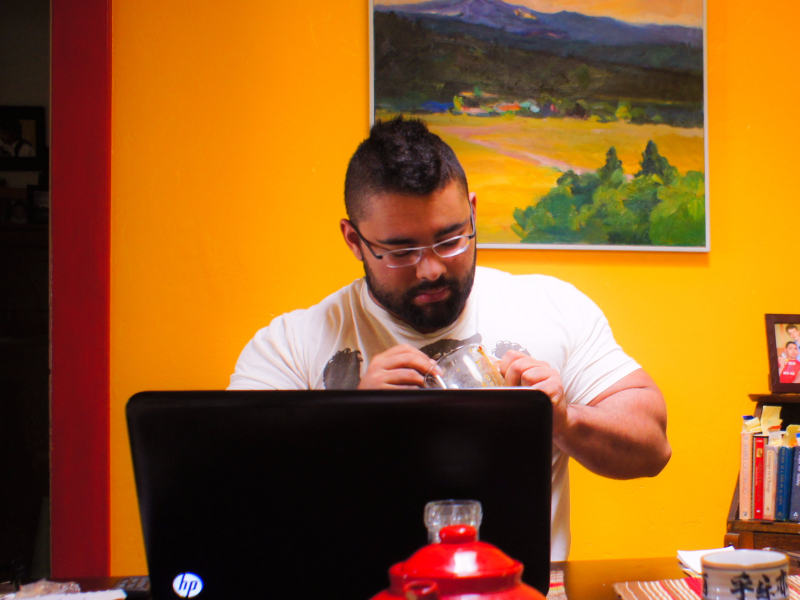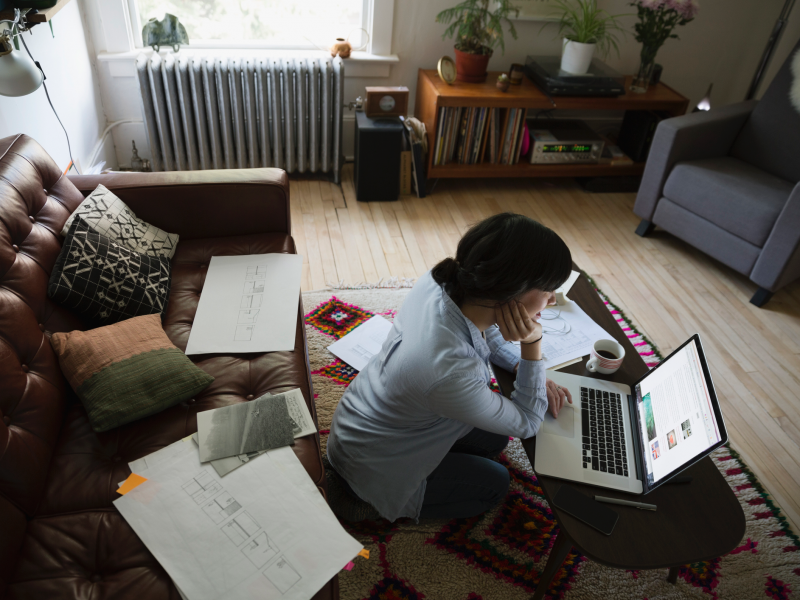- Working remotely can seem like a dream come true for many employees sick of their morning commutes – but it can present its own set of challenges.
- Loneliness, time management problems, and digital miscommunication are just some of the problems you may face if you work from home or have another remote arrangement.
- Here are nine of the most challenging aspects of working remotely, according to remote workers.
- Visit Business Insider’s homepage for more stories.
More and more people are working from home these days – or at least from a local coffee shop or coworking space. Between 2005 and 2017, there was a 159% increase in remote work, according to a recent report by Global Workplace Analytics.
But not everyone talks about the challenges of doing so, from a lack of a structured routine to fewer social opportunities for social interaction and rapport-building with coworkers.
“Many business leaders think that ‘going remote’ is as simple as sending a worker away from the office, equipped with a laptop and a to-do list,” Laurel Farrer, founder of the Remote Work Association and CEO of Distribute Consulting, told Business Insider. “Unfortunately, it’s not that simple. In fact, when the correct policies and procedures are not created to support off-site employees, terrible consequences are likely to occur.”
Related: 11 traits you need to be an effective remote worker
She said these may include career stagnancy, isolation, micromanagement, or burnout, and that transparency is the antidote to this problem.
We asked people who work remotely to share the most challenging aspects of their work arrangements. Here's what they had to say.
Problems with technology may not get resolved as quickly as they would in the office, and can make it difficult to work remotely.

Kate Crowhurst, director of Money Bites, said a downside to working remotely is dealing with technical difficulties.
"While the flexibility of remote work can be excellent, the challenge comes when your Wi-Fi drops out or your computer doesn't play ball," she told Business Insider in an email. "And then the IT guy on the phone is more concerned with logging a job than getting you back online so you can do your job."
Amber Baldwin, travel vlogger and founder of StoryChasing, has worked remotely all over the United States, Mexico, and Canada in her RV. She also said she finds technology can be difficult when working remotely.
"Getting a good cell signal for the internet in different countries and areas can be challenging," she told Business Insider. "Sometimes, places I travel to have a terrible cell signal, which means I can't work online. My business is 100% online, so I need to make sure I have a cell signal."
She said she's mitigated this challenge by having two hotspots with different networks and attaching a cell booster to her van.
"As long as there is a cell tower within reach, I can get a signal and work online," she said.
It's easy to get distracted when you're working from home, and you may not be as productive as you'd be in a traditional work setting.

Without other coworkers around to hold you accountable, you may not be as productive when working from home.
Ciara Hautau, lead digital marketing strategist at Fueled, just moved to Sydney in August and is still working for a New York City-based company.
"There was a period where I'd do anything to work remotely - I love being away from distractions and in the comforts of home," she said. "However, some days feel more motivating than others."
She said she's the type of individual that, when she gets home, she turns work off.
"However, when you're constantly in the comforts of home, it can feel a little tougher to motivate yourself when you're not around other working individuals," she said.
Marx, too, thinks working from home can be distracting.
"When you work at home, it is much easier to get distracted by kids, pets, and things to do at home, like laundry," she said. "Along with distractions, working from home can make it really easy to be lazy and not as productive as you would be when you are required to focus in the office."
Rachel Bodine, a writer for Expert Insurance Reviews, also said a major challenge of working remotely is trying to stay focused while also making sure to take periodic breaks.
"There are multiple distractions when working from home, from packages being delivered to pets deciding that you should play with them rather than work," she said. "Distractions around the home are easy to give in to, so I've had to learn to take a break every hour or two to get the mail or play with the dog. These breaks help me avoid burnout, especially if I'm working on a difficult project."
And the distractions get even worse if you're not good at following a strict schedule.

In a non-remote work setting, there is likely structure in place, from set office hours to set break and lunch times. But when working remotely, these may not exist.
Brett Downes, a specialist in search engine optimization and social media for DFY Links, said he can relate.
"I struggle to sleep, and, as a result, not get up in the mornings," he told Business Insider. "Not having to be in an office by a certain time allows my body to convince my mind to sleep in all the time."
Crowhurst, too, said a lack of routine can leave room for unnecessary distractions because of the lack of structure.
"Not having an office routine can mean that it's constantly snack o'clock and you need to resist the temptation to have multiple versions of lunch," she said.
Similarly, Baldwin said that one might think that, working remotely, you have a lot of freedom - and in some ways you do - but you can also easily get sidetracked.
There are several reasons for this, she said, including friends and family knowing you're home, so they're more inclined to call you, wanting to sleep in, and good weather tempting her to go outside and ditch work.
"With nobody managing your time but yourself, it's easy to get distracted when these challenges appear in your life," she said.
She said she's learned how to get focused by doing things such as sticking to a schedule, not taking personal calls during the middle of the day, setting an alarm clock, and getting up as if she were in an office, and scheduling and blocking her time on a calendar, from work tasks to meals to self-care.
With no coworkers in your living room, socializing with your peers can be a challenge and make remote work pretty lonely.

"Isolation is the biggest challenge," Downes said. "I used to bounce ideas off my coworkers, but now it is just me, all on my lonesome."
To cope with this, Downes said he now goes to a coworking space twice a week and works at a friend's house once a week.
"This gives me a good mix of social time to add to my work commitments, so I feel more inclusive and get to speak to people in person," he said.
Kristine Thorndyke, founder of the online business Test Prep Nerds, said the biggest challenge to working remotely is "the lack of forced interaction you have with people on a day-to-day basis. Thorndyke manages her company from Shanghai, and previously from Medellin, Colombia.
"Without having an office where you need to share pleasantries with your coworkers, boss, and clients, you need to find alternative methods of socializing with people on your own time," she told Business Insider. "It can be hard, especially for an introvert like me, to muster up the motivation to go out and meet people after a long day of work."
A lack of interaction with coworkers can also make team-building difficult.

The lack of interaction that often comes with remote work can also be a detriment to team-building - something that is built during meetings, lunches, or even water cooler conversations.
"Remote working is best achieved with at least quarterly face-to-face meetings with your team so that you can share experiences and build strong working relationships," Crowhurst said.
Lindsey Marx, who manages several blogs at BestCompany.com, also told Business Insider that working remotely makes it much more difficult to create and maintain relationships with coworkers.
"You can still message and email them, but it is not the same as having face-to-face interactions with them," she said.
Working remotely can mean inconsistent pay.

Downes said working remotely can also be stressful because of the inconsistent wages that come with freelancing.
"With my full-time job, I knew that no matter what happened, I would be paid at the end of the month, and it would be enough to cover my bills," he said. "But with freelancing, chasing invoices or payment disputes can result in major money and cash-flow worries."
Laurice Wardini, a freelance writer who also runs ClothedUp, a fashion website, agreed.
"Monthly income is unreliable and always changing," she said. "This goes for workload, as well - some weeks, I'm swamped with too much work, but sometimes, I don't have enough. It's difficult to find that middle ground. Freelancing is also especially difficult because gigs aren't usually long-term, so you need to spend much of your time searching for new opportunities."
Communication with coworkers or clients can easily be misconstrued.

Hautau said that she keeps in touch with her coworkers through Slack, email, and video chat. But that communication isn't always productive.
"The only frustration I have around communication is when a coworker is unresponsive on those channels," she said. "When I was in the office, I could simply visit that individual's desk and see them in person. But it's quite difficult to get those direct answers if they're uncommunicative via digital channels."
Frances Kuffel said she faces a similar issue. She works from home in Montana and is a freelance writer for clients on the East Coast.
"You can't, in an email or text, get a sense of a client's appreciation, approbation, approval, or other feelings on job performance," she said.
Andy Marthaler, a marketing director at Tradeshow-stuff who works remotely some days, also said he wonders how his written tone comes across to people.
"The thing that I am always worried about is if my tone is coming across accurately," he said. "When communicating with colleagues in person, my approach is always positive and light-hearted. However, when I am simply typing a quick message, I wonder if I sound too domineering or brash."
He said that while he and his coworkers like to joke around at the office, he always has to think twice when he's messaging someone a sarcastic comment.
"How might they read this," he said. "Do I need to add an emoji or something?"
Feeling that other people don't really think you are working can be frustrating.

Thorndyke said that there still seems to be a bit of a bias against people who work from home, as if they are not actually working.
"I think this is because, for many, when they do get a day to 'work from home,' they view it as a day to run errands, do the laundry, get their nails done, and pretty much do everything they can while still 'being available' on email," she said. "It's hard to communicate to these 9-to-5-ers that I work just about as much as they do, but from the comfort of my own home."
Tom Nathaniel, founder of LushDollar.com, agreed that not everyone takes working from home seriously.
"People think you don't work, so they always expect things out of you all times of the day," he said.
And it may be hard to find a healthy work-life balance.

Bodine said that one of the biggest challenges she's faced while working remotely is keeping a strict work-life balance.
"I've found that it can be easy to overwork myself when I work remotely, as working from home can sometimes feel like I never leave work," she said. "To combat this, I make sure I stop working at 5 p.m. every day and ignore the urge to check messages and assignments. Otherwise, I'm tempted to open up my laptop and just do 'five minutes of work,' which quickly turns into an hour."
Alberto Navarrete, general manager of Frisco Maids, a house-cleaning service in Dallas, works remotely and said it's easy to overwork yourself.
"Every hour in a day is a work hour," he told Business Insider in an email. "So if you are behind on a project, you can expend the extra hours in your day. This, after a while, is a dangerous practice, as you start to feel burned out pretty quickly, and you can pass 12 hours of your day working and never leave your living room."
To clear his head, he said he's learned to take breaks and go for walks, which helps him focus on work again.
Hautau, too, said that when you work from home, it can be hard to set work-life boundaries.
"Since your home is your office now, you're never technically 'leaving' work unless you turn off all communication platforms," she said. "I've made it a habit that once I'm done with work, I sign out of my email and my Slack - and do the same on my mobile - so I can enjoy a healthy work-life balance."

